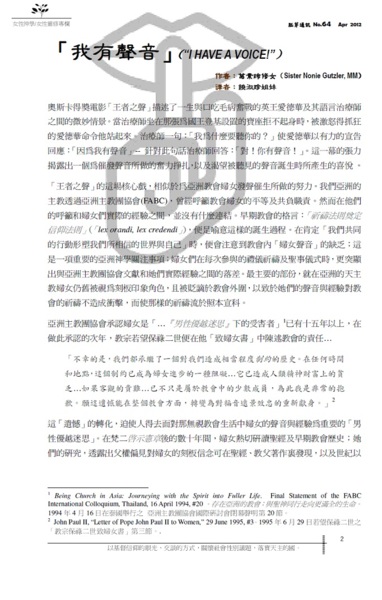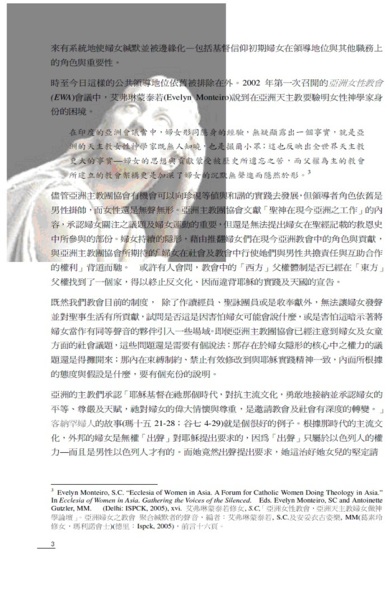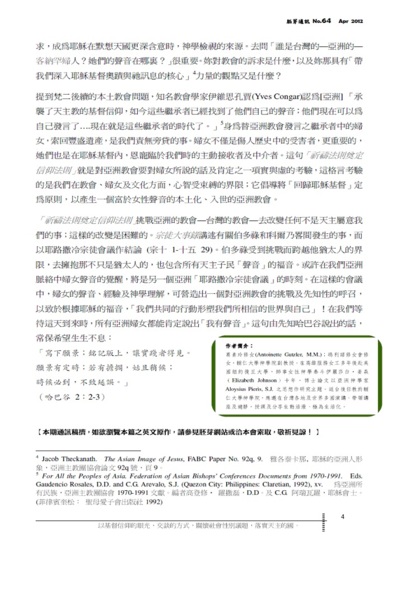

 字體:小 中 大
字體:小 中 大 |
|
|
|
| 2012/07/17 20:15:32瀏覽1024|回應2|推薦49 | |
(哈巴谷那一段,修女說翻得很雅,我有些意外. 事實是, 那時在圖書館找遍上下, 就是找不到一本聖經(很很很偏心喔~~),又不想再到回家發文了, 只好照自己原來翻的. 還是鄒修女說了之後,回頭去查聖經, 才發現我文字少了很多. 其實我覺得我應該是稍微算是忠於原文吧, 意思是,原文的字也不怎麼多的....... 也謝謝鄒修女的修正. < 「寫下願景; 銘記版上, 讓實踐者得見. 願景有定時; 若有擔擱, 姑且稍候; 時候必到, 不致延誤. 」 (哈巴谷 2: 2-3) “Write the vision; make it plain on tablets, so that a runner may read it. For there is still a vision for the appointed time; if it seems to tarry, wait for it; it will surely come, it will not delay.” (Habakkuk 2: 2-3) “I HAVE A VOICE!” 「我有聲音」 The Oscar-winning film “The King’s Speech” pivots on an amazing scene between King Edward, who struggled with a stutter his whole life, and his speech therapist. When the therapist would not get out of the chair designated for the King, a provoked and angry Edward commanded him to get up. The therapists query: “Why should I listen to you?” is met with Edward’s forceful declaration: “Because I have a voice!” – to which the therapist replies: “Yes, you do.” The power of that scene uncovers the struggle of “midwife-ing” a voice and the joy of bringing to birth a voice that longs to be heard. 奧斯卡得獎電影「王者之聲」描述一生與口吃毛病奮戰的英王愛德華及其語言治療師之間唯妙的情景. 當治療師霸坐在那張即將登基的王位座椅時, 被激怒得抓狂的愛德華命令他站起來. 治療師一句:「我為什麼要聽你的?」切中愛德華的宣告:「因為我有聲音」 -- 針對治療師的回答:「對! 你有聲音!」這一幕的張力揭露出一個為催發聲音所做的奮力掙扎, 以及渴望被聽見的聲音誕生時所產生的喜悅 . This core scene in “The King’s Speech” is analogous to the effort to “birth” the voice of women in the churches of Asia. Our Asian bishops, through the Federation of Asian Bishops’ Conferences (FABC), have called for the equality and co-responsibility of women in the church. However, there is a disconnect between their call and what women actually experience. It is here that an n axiom of the early church “lex orandi, lex credendi” ─ “the law of praying establishes the law of believing” ─ is instructive in this birthing process. The affirmation that “what we practice together shapes what we believe about our world and ourselves” draws attention to the lack of “women’s voices” in the church. This is a significant Asian theological concern. . It highlights the disconnect between the writings of the FABC and what women actually experience each time they participate in its liturgical prayer and sacramental rites. For the most part, Catholic women in Asia continue to be seen in stereotypical roles and relegated to the periphery of the church where their voice and experience does not impact the prayer of the Church and the orthopraxy that flows from that prayer. 「王者之聲」的這場核心戲, 可比喻為誕生亞洲教會婦女聲音而做的努力. 我們亞洲的主教透過亞洲區主教團(FABC), 曾經呼籲教會婦女的平等及共負職責. 然而在他們的呼籲和婦女們實際的經驗之間, 並沒有什麼連結. 早期教會的要理 「lex orandi, lex cred endi」 -- 「祈禱律就是信仰律」 -- 便是喻意這樣的誕生過程. 肯定「我們共同的行動塑造出我們所相信的世界與自己」, 便會注意到教會內「婦女聲音」的缺乏; 這是亞洲神學方面相當關注的一部分; 婦女們在每次參與的禮儀祈禱及聖事儀式時, 更突顯出與亞洲主教團協會文獻和她們實際經驗之間的落差. 最主要的部份, 就在亞洲的天主教婦女仍舊被視為刻板印象角色, 且被貶謫於教會外圍, 以致於她們的聲音與經驗在教會的祈禱中迴盪不出漣漪, 而使那樣的祈禱流於照本宣科. More than fifteen years ago, the FABC acknowledged that women are “. . . the victims of the “myth of male superiority.” The following year, Pope John Paul II addressed the church’s responsibility for this in his “Letter to Women.” 亞洲主教團協會承認婦女是「…『男性優越迷思』下的受害者」1已有十五年以上, 在做此承認的次年, 教宗若望保祿二世便在他「致婦女書」中陳述教會的責任… Unfortunately, we are heirs to a history which has conditioned us to a remarkable extent. In every time and place, this conditioning has been an obstacle to the progress of women . . . . it has resulted in a spiritual impoverishment of humanity . . . and if objective blame . . . has belonged to not just a few members of the Church, for this I am truly sorry. May this regret be transformed, on the part of the whole church, into a renewed commitment of fidelity to the Gospel vision. 不幸的是, 我們相當程度地承繼了歷史對我們的框架; 在每一個時空裏, 這樣的框架已成為婦女進步的的阻礙…. 導致人類心靈上的貧瘠….若客觀歸咎….教會該承擔的則不在少數, 為此我誠感歉意. 願這樣的遺憾能夠轉化, 讓全體教會在這個部分, 以福音觀點²重新立下忠實的承諾. The transformation of this “regret” urges confrontation with the “myth of male superiority” which does not take notice of the import of women’s voice and experience for the life of the church. In the decades following Vatican II’s Dei Verbum, women studied the and early church history in earnest. Their research uncovered the patriarchal biases and stereotyped beliefs about women found in scripture, the writings of the Church Fathers and the systematic silencing and marginalization of women throughout the ages – including the importance and role of women in leadership and other ministries at the beginnings of Christianity. 這「遺憾」的轉化, 迫使那無視教會生活中婦女的聲音與經驗為重要的「男性優越迷思」得要去面對. 在梵二啟示憲章 Dei Verbum後的數十年間後的數十年間, 婦女熱切研讀聖經及早期教會的歷史; 她們的研究, 透露出父權偏見對婦女刻板信念, 可在聖經、教會神父著作裏發現, 以及世紀以來有系統地使婦女緘默並被邊緣化 – 包括基督信仰初期, 婦女在領導地位與其他職務上的角色與重要性. This exclusion from public leadership continues today. At the first meeting of the Ecclesia of Women in Asia (EWA) in 2002, Evelyn Monteiro addressed the difficulty of identifying Catholic women theologians in Asia. 時至今日公共的領導地位依舊被排除在外. 2002年第一次召開的亞洲女性教會(EWA)會議中, 艾弗琳蒙泰若(Evelyn Monteiro)說到亞洲天主教要驗明女性神學家身份在身份的困境. The experience of the near invisibility of women at the Asian conference in India, undoubtedly reveals a reality that Asian Catholic women theologians are either not known or they are small in number. It also reflects the larger reality of the Church in the world – that women’s thought and contribution have suffered from historical forgetfulness and the patriarchal Church structure lends itself to women’s silence and invisibility. 在印度的亞洲會議當中, 婦女形同隱身的經驗, 無疑顯露出一個事實, 就是亞洲的天主教女性神學家既無人知曉, 也是叢茸小眾; 這也反映出全世界天主教更大的事實—婦女的思想與貢獻蒙受被歷史所遺忘之苦, 而父權為主的教會 所建立的教會架構更是加深了婦女的沉默無聲進而隱然於形. 3 Although the FABC has the opportunity to move into a praxis that prizes equivalence and harmony, male leadership roles continue to be privileged and women continue to be silent and invisible. Of note is the FABC document “praxis that prizes equivalence and” which acknowledges women’s concerns and women’s movements as important but fails to name women’s participation in the history of salvation as written in our Scriptures. This continued invisibility of women counters the FABC desire that “women exercise their right to co-responsibility and mutuality with men in society and in the church.” by subverting their role and contribution in the Asian church today. One may ask if the church’s “western” patriarchal structure has found(founded?) such a home in “eastern” patriarchy that it ceases to be counter-cultural and thus betrays the praxis of Jesus and the proclamation of the Reign of God. 儘管亞洲主教團有機會可以向珍視等值與和諧的實踐去發展,但領導者角色依舊是男性掛帥, 而女性還是無聲無形. 亞洲主教團協會文獻「聖神在現今亞洲之工作」的內容, 承認婦女關注之議題及婦女運動的重要,但還是無法點出婦女在聖經記載的救恩史中所參與的部份.. 婦女的持續隱形,藉由推翻婦女們在現今亞洲教會中的角色與貢獻, 與亞洲主教團協會所期待的「婦女在社會及教會中行使她們與男性共擔責任與互助合作的權利」背道而馳. 或許有人會問, 教會中的「西方」父權體制是否已經在「東方」父權找到了一個家, 得以終止反文化、因而違背耶穌的實踐及天國的宣告. Since our present church structure does not allow women to have a voice and contribution to sacramental life – with the exception of being lector, choir member or taking up the collection – one may ask if there is a fear of what women might say – or fear of the implications of bringing women into the arena as a partner of equal voice. . These questions need answer and yet, even though the FABC has taken note of social concerns regarding women and the girl child, it has yet to unmask the issues of power that lie at the heart of women’s invisibility and adequately address the underlying attitudes and assumptions that undergird a conditioning that inhibits effective change in accord with the praxis of Jesus. 既然我們教會目前的制度, 除了讀經員、聖詠團員或是收奉獻外, 無法讓婦女發聲並對聖事生活有所貢獻, 試問是否這是因害怕婦女可能會說什麼話, 或是害怕這暗示著將婦女當作有同等聲音的夥伴引入一些場域. 即便亞洲主教團協會已經注意到婦女及女童方面的社會議題, 這些問題還是需要有個說法; 那存在於婦女無從現身的核心中, 權力的議題還是得攤開來; 那禁止有效修改耶穌實踐精神, 所根據的態度與假設是什麼, 要有個充份的說明. . The Asian bishops acknowledge that “against the prevailing culture of “His times, Jesus courageously accepted and recognized women’s equality, dignity and giftedness. His great sensitivity and respect for women are an invitation for a deep conversion for the Church and society.” The story of the Canaanite woman (Mt. 15:21-28; Mark 7: 4-29) is a prime example. According to the prevailing culture of the time, this Gentile woman had no right to “voice” her request to Jesus since “voice” only belonged to the Israelites – and male Israelites at that! And yet, she claimed her voice. Her persistent plea for the healing of her daughter became a source of theological reflection for Jesus as he pondered the deeper meaning and implications of the Reign of God. It is crucial to ask who are the Canaanite women of Asia – of Taiwan – and where are their voices? What do you ask of the Church and what is your perspective that has the power to “take us deeper into the mystery of Jesus Christ and to the heart of his message.” 亞洲的主教們認同「耶穌基督在祂那個時代, 對抗主流文化, 勇敢地接納並承認婦女的平等、尊嚴及天賦, 祂對婦女的偉大情懷與尊重, 對教會及社會有很深度的轉變」客納罕婦人的故事(瑪十五21-28; 谷七4-29)就是個很好的例子. 根據那時代的主流文化, 外邦的婦女是無權「出聲」對耶穌提出要求的 , 因為「出聲」只屬於以色列人的權力—而且是男性以色列人才有的. 而她竟然出聲提出要求, 一個治好她女兒的堅定請求, 成為耶穌在默想天主神權更深含意時, 神學檢視的來源. 很重要的一個詢問, 誰是亞洲 – 台灣—客納罕婦人? 她們的聲音在哪裏? 妳對教會的訴求是什麼, 以及妳那具有「帶我們深入耶穌基督奧蹟與祂訊息的核心」4力量的觀點又是什麼? In speaking of local churches in the aftermath of Vatican II, eminent ecclesiologist Yves Congar reflected that [Asia] “received the heritage of Catholic Christianity. And now the heirs have found their own voice; they can now speak for themselves. . . . It is now the time of the heirs.” It is incumbent on us to reclaim that rich heritage for women who are among the heirs that will speak for the Asian church. Women are not only “victims” of a damaging history; they are more importantly the active recipients and agents of the grace that has come to us in Jesus Christ. The axiom lex ordandi, lex credendi is a litmus test for what the church in Asia wants to say and affirm of women. It tests the limits of our mental boundaries about church, women and culture. It advocates a “return to Jesus” as formula for the birthing of an inculturated, participatory church in Asia that is rich with the voices of women. 提到梵二後續的本土教會問題, 知名教會學家伊維思孔賈認為[亞洲] 「承襲了天主教的基督信仰, 如今這些繼承者已經找到了他們自己的聲音; 他們現在可以為自己發言了….現在就是這些繼承者的時代了. 」5身為為亞洲教會發言繼承者中的婦女, 索回豐盛遺產, 是我們責無旁貸的事. 婦女不僅是傷人歷史中的受害者, 更重要的, 她們也是在耶穌基督內, 恩寵臨於我們的主動接收者及中介者. 這句「祈禱律就是信仰律」就是對亞洲教會所要說的話, 一項實與虛的考驗, 以及對婦女的肯定. 這格言考驗的是我們在教會、婦女及文化方面, 心智受束縛的界限; 倡導將「回歸耶穌基督」定為原則, 以產生一個富於女性聲音的本土化、入世的亞洲教會. Lex ordandi, lex credendi challenges the church in Asia – the church in Taiwan – to change whatever is not the desire of God for us. This change is difficult . The Acts of the Apostles tells of the encounter between Peter and Cornelius which concluded with the Council of Jerusalem (Acts 10:1-15:29). Peter was challenged to step out of his Jewish boundaries and embrace a Gospel that included the “voice” of all God’s people not only Jews. Perhaps the awakening of women’s voices in our Asian context is another “Council of Jerusalem” moment for Asia. At such a Council, women’s voice, experience and theological understandings would be able to craft a challenge and a prophetic call to the Asian church so that “what we practice together shapes what we believe about our world and ourselves” according to the Gospel of Jesus! As we await the day when all women of Asia can affirm “I have a voice!,” the words from Habakkuk keep hope alive: 「祈禱法則奠定信仰法則」挑戰亞洲的教會 –台灣的教會—去改變任何不是天主屬意我們的事; 這樣的改變是困難的. 宗徒大事錄有關伯多祿和科乃爾略Conrnelius間發生的事, 而有耶路撒冷協議 (宗十1-十五29). 伯多祿受到挑戰而跨越他猶太人的界限, 去擁抱那不只是猶太人的, 也包含所有天主子民「聲音」的福音. 或許我們亞洲地區婦女聲音的覺醒, 將是另一個亞洲「耶路撒冷宗徒會議」的時刻. 在這樣的會議中, 婦女的聲音、經驗及神學理瞭, 可營造出一個對亞洲教會的挑戰及先知性的呼召, 以致於根據耶穌的福音「我們共同的行動形塑我們所相信的世界與自己」! 在等待這天到來時, 所有亞洲婦女都能肯定說出「我有聲音」. 這句由先知哈巴谷說出的話, 常保希望生生不息: 「寫下願景; 銘記版上, 讓實踐者得見. 願景有定時; 若有擔擱, 姑且稍候; 時候必到, 不致延誤. 」 (哈巴谷 2: 2-3) “Write the vision; make it plain on tablets, so that a runner may read it. For there is still a vision for the appointed time; if it seems to tarry, wait for it; it will surely come, it will not delay.” (Habakkuk 2: 2-3) Sister Nonie Gutzler January 24, 2012
|
|
| ( 知識學習|其他 ) |












